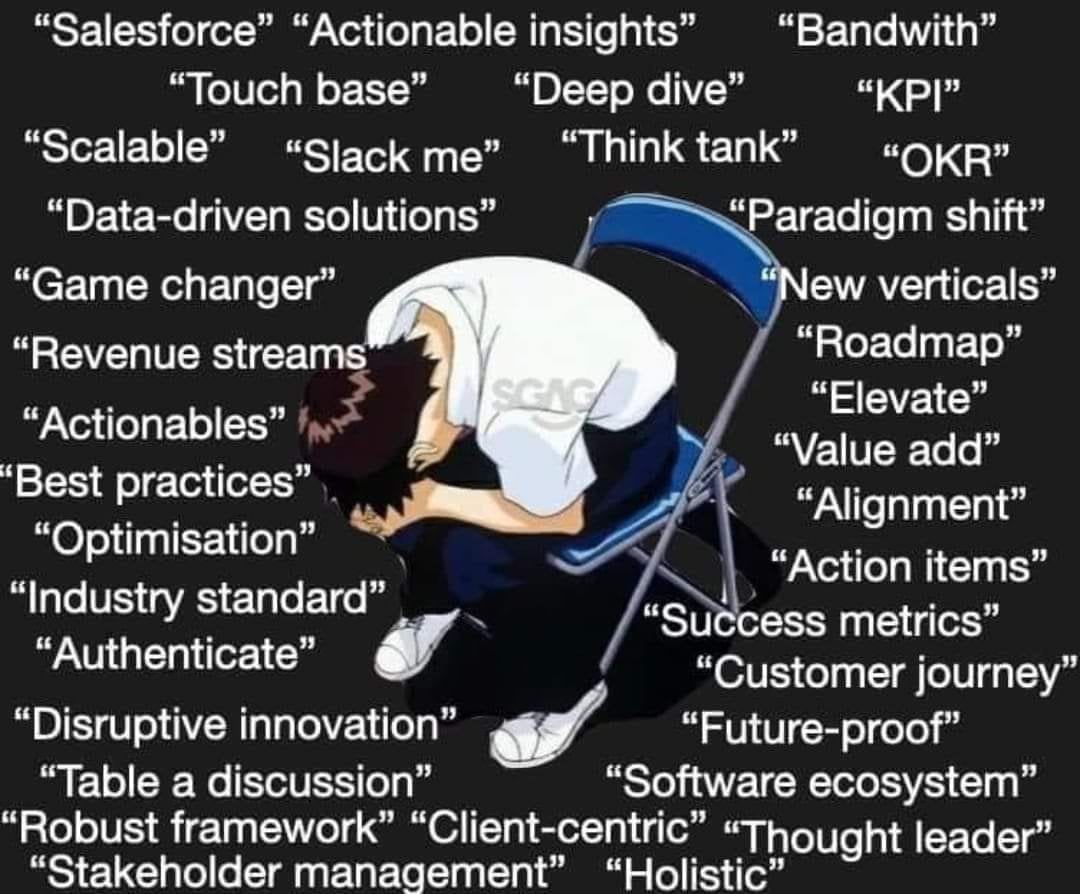this post was submitted on 20 Sep 2024
850 points (99.1% liked)
me_irl
4595 readers
979 users here now
All posts need to have the same title: me_irl it is allowed to use an emoji instead of the underscore _
founded 1 year ago
MODERATORS
you are viewing a single comment's thread
view the rest of the comments
view the rest of the comments

I don't understand why business people do this to themselves. I quit working for large organizations in favor of smaller companies that pay less, because at least there's much less of this. It does get unbearable.
Lingo is a powerful social tool. Once you know to look for it, you see it everywhere.
Some lingo is always necessary for jobs to communicate complex ideas quickly. Everyone has terms and phrases used in their profession that are exclusive to it, as well as some that are exclusive to their workplace. People outside of their job don't know the lingo, those inside do. In this way lingo is a double-edged sword: it eases communication, but creates a social barrier between those in the know and everyone else.
In an increasing number of places this isolating side effect has been used by certain groups as the motivation for them to contrive lingo. For a long time this was largely relegated to cults and other fringe groups that wanted to shore up the feeling of togetherness of the people within and keep them away from outsiders.
The big change was when groups found that by constantly changing the lingo they could induce two other effects: the exclusion of outsiders and exerting control over existing insiders. The MBA/business types are a prime example of this. For people in or seeking to be a part of the group knowing the latest buzzwords is a must, and not knowing them or using outdated ones opens them up to being ostracized. People who are "in" must constantly stay up to date, thus staying attentive to the trends of the group. At the same time people with a casual interest or interaction are actively dissuaded by how often unfamiliar words are used by members of the group.
This sort of weaponized use of lingo is much more widespread these days. Once you see it in this case you can find it in just about every flavor of modern political group and online forum. If you find a group that seems to always be changing its buzzwords, buyer beware.
You are "on point". 😁
I try to use as little lingo as possible, only as much as necessary.
That's also part of the game. People who over-use lingo are recognized as bullshitters.
Are you implying that on point is an example of this type of lingo?
A quick search shows me that on point has been used in the military as a way to describe a soldier being stationed at their post or standing guard as far back as the 1880s. It was used in ballet in the early 1900s, and used in legal contexts in the 1930s.
When the “lingo” that the slang is derived from dates back to the 1880s, almost 150 years ago, I think it ceases to be lingo and just becomes language.
Yes, "on point" is slang, but only just recently. Slag is just a little further down the scale in terms of specialized language.
The real test is how accepted a word or phrase is with the larger population using a given language (while keeping a specific meaning in mind). This gets a little muddied with the lingo used by larger groups.
For instance the phrases "weird" and "cat lady" have both been co-opted by the major political parties in this election to decide their opponents. Because they each have so many members and because their discourse is covered by media outlets the new connotations of those phrases will be more widely known outside of the group and will stop being lingo much faster than the phrases you use privately with your family or coworkers.
"On point" used to be lingo in the military once upon a time, but because of the size of the military (and aided by the internet) it has become slang and is no longer a phrase only used by a certain group.
And there's the rub. Lingo isn't inherently evil, in fact it's necessary to get through day-to-day life. You can't refer to every tool you use on the job with a short sentence explaining what it is, you say it's name and the people you work with know what you're talking about. The only time lingo must be avoided is when talking about something you're familiar with with someone who isn't to avoid putting them off or confusing them.
The real danger is people not realizing how (contrived, constantly changing) lingo can be used to manipulate them, specifically how it drives tribalism and the "us versus them" mentality. This is especially important given how political movements and other groups behave online, and how prevalent this tactic has become over the past decade.